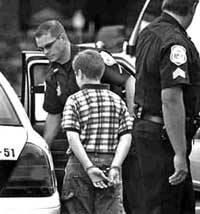

 IT seems that the Ministry responsible for Social Affairs is now looking at ways to address the issues the Youth Residential Treatment Centre has to deal with on a daily basis. In
IT seems that the Ministry responsible for Social Affairs is now looking at ways to address the issues the Youth Residential Treatment Centre has to deal with on a daily basis. In
The question is why the sudden increase in what is termed juvenile delinquent? For the past few years, broken homes, a child's family position, and family size have been the subjects of considerable study in the crime and delinquency field. In 1950, there were 40.5 million children living in homes containing both a father and a mother, and 4.1 million children living in broken homes according to the U.S. Census Bureau.
In today's modern world, the working class increasingly resembles the low-income family of the early 1960's. With the increase in such patterns as divorces, separations and working mothers, children are increasingly being entrusted to daycare centers, neighbors, home alone and the television. Child-rearing patterns have, thus, undergone drastic changes.
There are instances when children who return home to empty houses are left on their own for hours to await the return of their parents. Tendency is that the children are probably home alone too often, and as a result, creates an “emotional vacuum,” where children grow up without any values or goals.
We cannot always place the blame on parents. But the structure within the family household could determine the extent of delinquency manifested by a juvenile. Family relationships, duties, responsibilities and privileges, and the amount of control exercised over children all play roles in forming character and influencing behavior. The attitudes and actions of parents can create an important influence in the lives of children. Families in crisis will most likely affect the behavior of juveniles.
When crisis occurs in a family, children have no power or choice other than to suffer the consequences. But when they do try to fight back, it is likely to land them in the courts or in a setting for emotionally disturbed children. The family is, therefore, an important factor in the forces that determine delinquency. The family determines a child's class, structure, and development, and the nourishing process is vital to formation of a child's development.
So families need to be aware that if they have conflicts that are not being resolved in positive ways they are influencing future behaviour of their children. This is an important issue that needs to be addressed when looking at what to do with young people of whom parents have lost all control. It then becomes the society's problem, and hence the need of a proper treatment and rehabilitation centre.